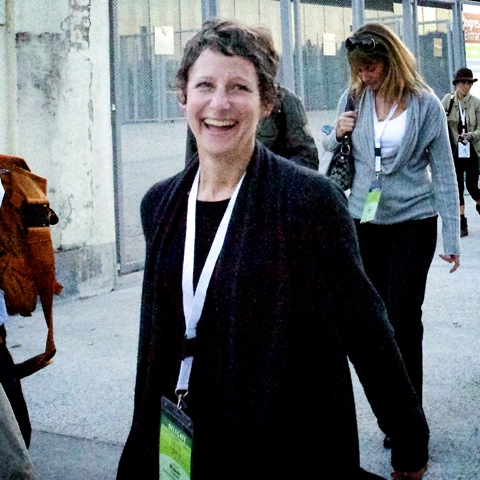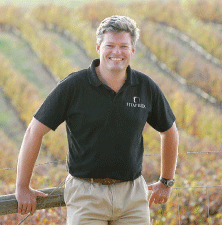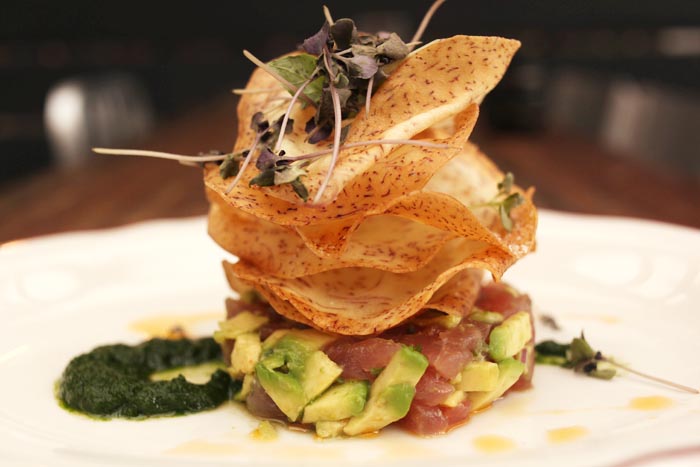Words by Sarah Crawford, photos by John Gundy
 It was the perfect beginning. On our first evening in Turin we dined at Rural restaurant, where we were one of many tables of Terra Madre / Slow Food folks enjoying delectable contemporary takes on regional Italian cuisine.
It was the perfect beginning. On our first evening in Turin we dined at Rural restaurant, where we were one of many tables of Terra Madre / Slow Food folks enjoying delectable contemporary takes on regional Italian cuisine.
My scrawled notes from the evening include these words that were inscribed on the wall: “Italian food: it’s the food of a town, the recipes of a mother.” And, “Every taste has a story to tell. Start listening!”
And so began a time of intensive tasting and listening over the course of Terra Madre 2010, and its accompanying food festival, il Salone del Gusto.
Perhaps I was both literally and figuratively a little intoxicated from my first moments in Turin and that delicious meal, but my notes from my days at Terra Madre (Oct. 21-24, 2010) are infused with a sense of excitement, discovery – and optimism. The Slow Food delegates (farmers, fishers, cooks, educators, activists), observers and media people who were there will know what I mean. To the thousands of attendees from over 150 countries, ‘Terra Madre’ is understood to be about more than the conference itself; the words connote the broad and many would say thrilling shared experience of being in Turin, connecting with like-minded people from around the world, the sensory delights of the massive Salone del Gusto, the gatherings – spontaneous and planned – of new friends, long-time colleagues, locals, and encounters with the rock stars of the Italian and international Slow Food movement.
Convened in Turin every two years since in 2004, Terra Madre is “a world meeting of food communities” bringing together “the food and agricultural production sectors of 150 countries who are committed to defend and promote production that respects the environment, safeguards food biodiversity and advocates social justice.” It is Slow Food’s major event.
Slow Food is a global, non-profit member-supported association, founded in 1989 “to counter the rise of fast food and fast life, the disappearance of local food traditions and people’s dwindling interest in the food they eat, where it comes from, how it tastes and how our food choices affect the rest of the world.” The organization reports over 100,000 members participating as members of 1,300 local chapters — or convivia, in Slow Food speak – worldwide.
Slow Food Canada’s website (slowfood.ca) reports more then one thousand members belonging to thirty convivia nationally. In addition to local convivia-led projects, Canada has representation on Slow Food’s International Council and has championed important issues such as the degradation to wild salmon in Canada that led to the creation of Canada’s Wild Salmon Manifesto.
A significant part of the Terra Madre experience is Salone del Gusto, and when not attending TM sessions, people wandered the massive showcase that this year featured 910 exhibitors. Better men than I were defeated by attempts to sample morsels from each of the hundreds of booths: small-scale food producers from around the world featuring 182 Italian Presidia and 106 international Presidia from 46 countries. I hit the wall of cured meats, cheeses and wine by day two.
Continuing TM’s educational mandate Salone del Gusto also helped visitors learn about international food products at risk of extinction that use “traditional processing and/or agricultural methods and safeguard native breeds and local plant varieties.”
Terra Madre launched officially with formal Opening Ceremonies, impressive for their ability to showcase and celebrate diversity – in people, culture, food, biology, agriculture, environment, politics — which would be one of the dominant themes of the gathering.
Carlo Petrini welcomed the thousands of delegates assembled in the massive Palasport Olimpico Isozaki. The mood was jubilant and high-energy as the spectacle unfolded. Each of us had a set of headsets and could dial up our preferred language provided by what must have been a massive team of translators.
Petrini, in addition to being Slow Flow founder and international leader, is their unofficial philosopher. He identified four groups as “depositors of traditional knowledge”, yet who are also the least considered by politicians and the media: indigenous peoples, farmers, elderly people, and women. Petrini believes these people are treated as though they are “the weak part of humanity”, and cautioned “when we are at the end, at the black hole, these are the ones we should listen to.” In a message we would hear repeated over the subsequent days, he called upon young people to reach out and connect with them. “The destiny of these groups is in your hands, young people.”
He closed in exhorting the power of simply coming together – in all our diversity — for a common cause and with a common interest. Pointing out that Slow Food is not an organization, but a mechanism to bring people together. “Within dialogue and meeting, there is a deep sense of brotherhood. Without it, neither liberty, freedom nor equality exist. It’s what Terra Madre is all about; it’s about the value of the meeting.”
He concluded by asking that we “live intensely in these four days”, and dutifully, we did.
The ceremonies also focused on the plight of indigenous peoples and threats to their traditional food cultures and livelihood. Indigenous leaders from Africa, Latin America, Asia, and northern Europe shared their stories.
Turin’s mayor seemed to have drunk Petrini’s kool aid and he spoke to the converted with passion and conviction. “We need to invest in opportunities for young people to live a life in agriculture”. Calling on the international audience to work together to effect change, he said: “An open world is beautiful. No to barriers! No to fear!”
Diversity was an inescapable and dominant theme of the gathering and made manifest again and again. Sessions, panels and workshops gave life to the concept that was celebrated as the antithesis of mono-culture, industrial agriculture, unfair labour practices, genetic modification and loss of local and traditional cultures.
In one of the sessions I attended, farmers shared their stories of creating local farms where young people learned about sustainable growing practices, challenging what they’d been told in formulaic agriculture programs at university.
A South African farmer described his program “Unlocking Hidden Potentials of Young Organic Farmers”, in which 1,000 kids participated last year. In addition, 300 orphaned young people received training in his DIRT (Dynamic Intelligent Responsible Teenagers) program.
A farmer from Brazil explained how his thinking was transformed by having attended Terra Madre 2007. As well as reaffirming his commitment to sustainable practices and increasing biodiversity, he connected with a European student from the University of Gastronomic Sciences who helped him design and implement an irrigation system based on her research. He believes his farm has fundamentally and positively changed the food system and the way people think about food in his area.
Not every session or workshop was brilliant or useful. I heard people complain about the lack of detailed information available in advance about sessions and speakers; one had to work at figuring out what would be most relevant and worthwhile. That said, some of the most interesting and meaningful experiences at Terra Madre occurred in the commons area where delegates gathered to regroup and sample for international Street Food.
As always in life, it seems you get out of Terra Madre what you put into it.
Most of the Canadians delegates and observers I’ve connected with during and after TM were inspired and creatively charged by their experience. That’s not to say I didn’t hear some criticisms — and about Slow Food itself — but the negative comments and suggestions for improvement have more to do with operational and structural components of both TM and SF and I will not explore them here.
Somehow, it was hard to not feel optimistic. The mission and philosophy that light the Slow Food movement burned bright at Terra Madre, fueled by a panoply of extremely compelling and intelligent people who’ve spent a lot of time thinking about the issues and devoting their energies and in some cases their lives to advancing the cause.
Despite seemingly overwhelming obstacles and what can appear to be an irreparably damaged planet, Terra Madre re-affirmed the belief that as individuals we do have the power to reshape our food production system, preserve bio-diversity and food culture, as well as the knowledge and wisdom of food communities. And together, as an international group, Slow Food can have an influence that is more than the sum of its parts.
The scale is impressive: this year, Slow Food reports that Salone del Gusto and Terra Madre attracted a record 200,000 people, approximately 30% from outside of Italy.
At the end of each day, my immersion in “good, clean fair food for all” continued with reading a chapter or two of Raj Patel’s excellent The Value of Nothing. One of the passages I’ve underlined resonates with me now as I reflect on Terra Madre:
“ …. We have to start from where we are, with the politics we have [at] hand. T.S. Eliot put it well: “Success is relative: it is what we can make of the mess we have made of things.””
Slow Food is literally about a good food revolution, and at Terra Madre – my first, and, I hope, not my last — we had a palpable sense of being part of a vital social movement.
* * *
So how to move and take action?
These are just a few of the questions that were discussed among the Canadians attending Terra Madre:
- How can Slow Food grow and strengthen in Canada?
- How can activities among Canadian convivia best be coordinated?
- How can we bring together the Canadian community?
- How can we engage the next generation in Slow Food?
- How can eaters/consumers become more connected to the growers/producers?
- How can we engage our policy-makers and government?
- On what strategies should SF Canada focus to reshape the Canadian food production system and influence Canadian food policy?
- How can and should SF Canada attract sponsorship money and from whom?
- What can be done to raise awareness and broaden the base of support for Slow Food principles in the general public?
Every delegate I spoke with during and after the conference said the best part of Terra Madre was meeting and connecting with people; sharing stories, knowledge, practical experience, best practices, food and wine. Here are reflections from some of them on what was most significant about Terra Madre:
Mara Jernigan – Chef and Acting President, Slow Food Canada:
“To me it is ironic that the two biggest Canadian Slow Food meetings we have ever had have taken place on Italian soil. Of course TM is a remarkable event and is really transformative for so many of the delegates that attend, especially for the first time. Now we need to work on turning that energy and enthusiasm into action. We can take the positive examples we learn at Terra Madre and learn to apply them to our own country, especially in the case of quality artisanal ingredients, integrated production systems, and cooperative models. But we also need to learn from the political engagement we see in Europe, especially when it comes to agriculture and the environment. There is a big ecological cost to all of us flying to Italy. We have to ensure that we use what we have learned to improve and protect what we have in Canada and look at ourselves in an international context, which I think we seldom do. European politicians attend Terra Madre and are at least aware of Slow Food’s impact on producers and tourism, at least in economic terms. On Terra Madre Day on December 10th all convivia in Canada need to take the policy document developed by Slow Food and their networks for Terra Madre and share it with as many policy makers and politicians as possible.”
Lauren Baker – Sustain Ontario; soon to be with Toronto Food Policy Council:
“For me, the biggest take-away was about investing in diversity, in people, food products, culture, markets. Seeing the products in the Presidia was the best part; understanding how there’s a story behind each one.”
“Terra Madre reminds us of the extent of the global community, and that the food movement is very distributed, not centralized. It’s about supporting food communities.”
Lauren was moved by the closing ceremonies, and in particular the comments by Manfred Max-Neef, a German-Chilean economist and environmentalist.
Ruth Klassen – Chef and Owner Monforte Dairy:
“For me, it was extraordinary,” Ruth told me. “I went to everything. I feel very lucky to have been there.” She has plans to go to Slow Cheese next year.
This was the second Terra Madre for Ruth, who came away energized and inspired by some of the excellent sessions she attended, especially ones she discovered at Salone del Gusto.
She also was struck by the power of bringing all Canadian Slow Food members into one room. She sees huge benefit in sharing more between convivia, building local convivia, and focusing on moving forward rather than indulging in negativity and provincialism.
“We need to pull together more as a Canadian group!”
Chris McDonald – Chef, co-owner Cava Restaurant, and XocoCava:
“You come away with a lot more to think about,” said Chris after his first TM experience. “I guess I now have more paradigms to satisfy my needs. It used to be all about engagement. Now, it’s about: make it taste good; be sensitive to health and environmental issues; maintain a sense of pleasure and fun. The more I learn the more I as a restaurateur have to raise the bar and make it meaningful.”
Michael Howell – Chef/Owner Tempest Restaurant in Wolfeville, N.S., leader of Slow Food Halifax, President of Restaurant Association of N.S.:
It was Michael’s third Terra Madre so part of him “is a little bit jaded – but not in a bad way.”
For him, Terra Madre has always played a pivotal role in bringing together Canadians who care about food. He’ll never forget his life-changing first TM in 2006 where as one of 33 Canadian chefs and cooks, his eyes were opened to the diversity of Canadian talent, and the power of the bond forged by the group. He remembers that the Canadian Chefs’ Congress was born out of that gathering.
At previous Terra Madres, one of the highlights for him has been hearing and learning from the legendary Vandana Shiva whose passion and tenacity inspired him. This year, he had to miss the closing ceremonies where Shiva spoke.
This year, bringing together the Slow Food people from all over Canada was the most significant and meaningful element of Terra Madre for him. “It’s an excellent way to learn about what’s going on in the rest of the country. It’s exciting to get together with others who share similar ideas and goals.”
As the leader of a SF convivium on Canada’s east coast, he’s struggled with how to best achieve goals, establish connections with government and policy-makers, and attract sponsors. He sees Slow Food as “a kind of charcoal filter through which approaches and ideas are processed.”
He notes that Petrini espouses philosophical ideas, which are useful and set the foundation for Slow Food, but Michael is interested in action.
Through his involvement on the boards of local food policy groups and tourism organizations, and as president of the Restaurant Association of Nova Scotia, he’s hoping that Slow Food principles will be embraced and understood by as a broad a base as possible.
He’s especially pleased that he was able to convince the senior marketing representative of the N.S. Department of Agriculture, Fisheries and Acquaculture to attend this year’s conference. For him, one of the most gratifying things about Terra Madre was “seeing this guy’s eyes light up with possibilities for how Slow Food can enhance the economics of Nova Scotia” through agri-tourism and the celebration of local food and culture.
Michael MacMillan – Co-founder, Samara and Co-owner Closson Chase Vineyard and Winery:
“My main thoughts are that it was fun and I met some terrific fellow Canadians there. My other thought is that I was somewhat disappointed at how basic the level of discussion was at the formal conference sessions. It was as if we were in the Sustainable Food and Agriculture 101 class. Surely everybody at the event was already a convert and could have participated in a more advanced discussion. Anyway, an enjoyable few days.”
Karen Jull – Senior Product Developer, Bakery, Loblaws:
As “a newbie to Terra Madre” Karen had a “very positive experience”, and can’t wait to attend the next one.
Professionally, she was particular inspired by Salone del Gusto and came away thinking about the importance of showcasing local foods. An educator outside of her workdays, teaching yoga to kids, Karen was also keenly interested in Slow Food’s education manifesto.
But the most powerful part of TM – a view shared by most people I spoke with – was the connection with other people with a common interest. “It’s funny how it takes being away to connect with people so close to home.”
Bobby Grégoire – Spécialiste en gastronomie communications et événements, leader Slow Food Montréal, member l’Association canadienne pour la presse gastronomique Semences du patrimoine:
“Terra Madre is a global network of food communities who try to create a real alternative to the actual globalized and failing food system. For me it also expresses a redefinition of international relationships based on equality and diversity for a world that is fair, clean and certainly delicious.
“With a lot more to offer than conferences and workshops, Terra Madre is a inspiring and invigorating event where we connect with people who share their experiences, challenges and problems in defense of good food. Terra Madre is a meeting to share, to learn best practices and innovations to make live the Slow Food Philosophy.”
Bobby’s highlights: Land Grab conference (Salone); Graniaries of memory presentation by Vandana Shiva and Carlo Petrini: encounters with people from the United States, Italians, French, Africans, other Canadians and people from abroad.
Owen Steinberg – Chef, Coordinator – Integrated Culinary Management, George Brown College:
“Terra Madre was a phenomenal experience.”
Owen has a unique perspective; though it was his first Terra Madre, he is far from unfamiliar with Slow Food.
As a chef and culinary instructor Owen has worked according to Slow Food principles over the course of his career, which began when he was chosen as one of 10 people to take part in the Premiere Stage Piemontese hosted by Carlo Petrini and Lidia Bastianich in 1993, immediately upon graduating from the Culinary Institute of America.
Owen left TM renewed and invigorated, with a strong desire to become more involved in Slow Food. As a chef, entrepreneur and educator, Owen feels it’s time to share his unique experience and provide help and guidance to students. “It’s time to use some of my energies to give back.”
Owen appreciated the open marketplace, the cultural exchange and educational series offered by TM, but wished there’d been more of a focus on real-life experiences, practical initiatives and concrete information about issues such as financial viability. “I would always like to see five concrete take-aways, rather than 15 philosophical discussions”.
Owen’s positive experience prompted him to think about how students can participate. “It would be great for students in a variety of disciplines to attend TM. Perhaps we could look at a mentorship and scholarship program to send, say, 10 students in future years. It would be motivational and awakening for them.”
He was encouraged to see how large and strong a community the Canadian group is, and liked the energy and scope of ideas and activities shared. For example, he applauds Michael Howell and the Halifax area team for their successes.
Barry Martin – Principal, HYPENOTIC:
“I believe in the power of focusing on the positive; it’s a waste of time to decry the bad guys.”
Like many of his fellow Canadian delegates, he left feeling empowered by TM, and especially motivated and inspired by the speakers at the closing ceremonies.
Terra Madre reminded Barry that we should think of ourselves as part of a larger system and movement and that our compounded actions make a positive difference.
Barry says TM was an excellent forum to hear about the work that others are doing across Canada. “If each of us, and each convivium, sets objectives and develops clear strategies, we’ll see greater success.”
He admired TM and Slow Food founder’ Carlo Petrini’s recognition of and insistence for diversity of thought and freedom of expression, noting the grace with which he handled the animal rights protesters who interrupted the closing ceremonies. When the protesters approached the stage, megaphone in hand, demanding three minutes, Petrini let their voices be heard, encouraging them and asking the audience to hear them out.
John Gundy – Photographer:
“Learn, meet, come away and something: that’s what Slow Food and Terra Madre are all about.”
For John, Slow Food enabled him hear people who bring a whole new perspective on food sustainability, reinforcing his view that “Slow Food is not a club, it’s a resource.”
As well as participating in sessions, John saw Salone del Gusto and Terra Madre through the lens of his camera.
Terra Madre called him to think about what role he can best play to make a positive difference, and he says an idea has taken shape: John’s photographic images can communicate notable stories from the Slow Food community to his own Ontario-based community. Just as Ansell Adams’ photographs of the natural world inspired the creation of national parks, John hopes that his work will document successes internationally that will galvanize action locally.
“As individuals, we can and should make a difference.”
* * * *
On December 10, 2010, the Slow Food and Terra Madre network across the world will celebrate eating locally with the second Terra Madre Day.
For more information on Toronto convivium events go to: http://slowfood.to/1768/events/terra-madre-day-2010
For more information on all Terra Madre Day events worldwide, got to: http://www.terramadre.info/pagine/incontri/welcome.lasso?n=en

 Sarah Crawford is a former media executive specializing in communications and corporate social responsibility who likes to garden, cook, and write. John Gundy is a Toronto-based professional photographer whose website is johngundy.ca.
Sarah Crawford is a former media executive specializing in communications and corporate social responsibility who likes to garden, cook, and write. John Gundy is a Toronto-based professional photographer whose website is johngundy.ca.





























Trackbacks/Pingbacks